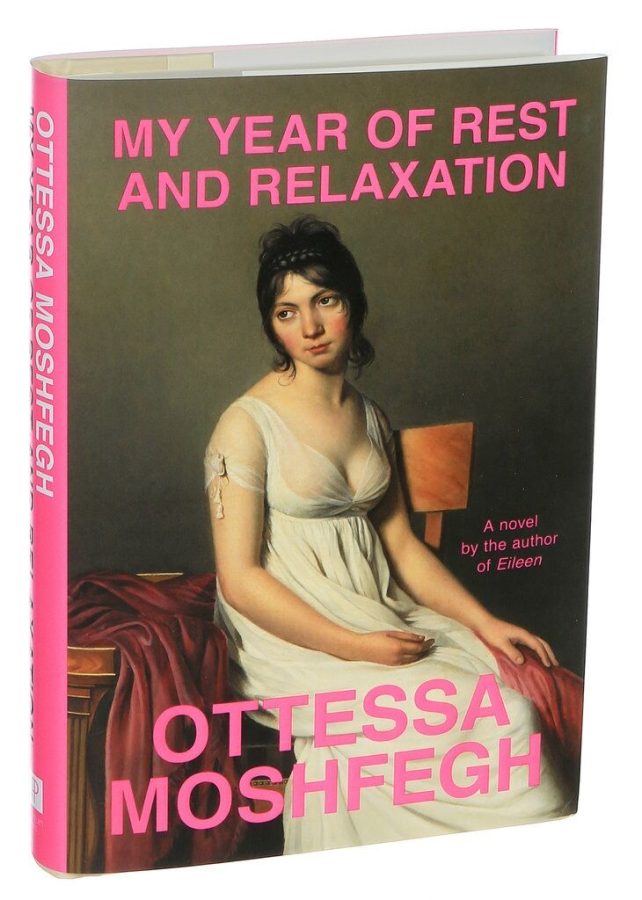The Book Buzz: My Year of Rest and Relaxation
Courtesy of Alessandra Montalto/The New York Times.
The cover of Ottessa Moshfegh’s novel.
September 1, 2021
Ottessa Moshfegh begins “My Year of Rest and Relaxation” in a pre-9/11 New York narrated by an unconventional, unnamed, 20-something woman. The narrator, who is orphaned but painfully rich after the death of both her parents, is a Columbia graduate with a rather useless degree in Art History.
“My Year of Rest and Relaxation” alternates between the narrator’s current state, jobless and isolated, to her past, which deals with death, grief and her former career and relationships. Above all else, it is crucial to note the narrator’s love of sleep, as she claims “Sleep felt productive. Something was getting sorted out. I knew in my heart — this was, perhaps, the only thing my heart knew back then — that when I’d slept enough, I’d be okay. I’d be renewed, reborn.”
While Moshfegh creates a plot that is, on the surface, repetitive and disturbing, she struggles with the complex debate of what it means to be alive and the challenges that come with it.
The narrator, though she is young, slim, beautiful and wealthy, refuses to live in the outside world after her failed post-graduation attempt. Through the help of her psychiatrist, Dr. Tuttle, the yellow pages finest, the narrator compiles an ammunition of pills, including but not limited to, Ambien, Ativan and lithium. The character of Dr. Tuttle, showcasing Moshfegh’s fantastic ability to write whimsical characters, is hilariously unaware of the narrator’s dire situation, which is hidden by complaints of insomnia. The plot, or lack thereof, is fueled by the narrator’s blackouts, which occur frequently due to the concoctions of pills she is prescribed. During these blackouts, the narrator finds herself rekindling old love and friendship, partying and waking up in a groggy state nearly every afternoon. The protagonist is visited occasionally by her best friend Reva, a desperate socialite-wannabe, although she dreads Reva’s ‘meaningless’ visits. Reva provides a necessary juxtaposition to our narrator as she can only dream of the money, status and body her best friend is so ungrateful for. Through this friendship, Moshfegh touches on subjects such as abortion, eating disorders and wealth issues.
After being prescribed new pills, thanks to Tuttle’s oblivion, the narrator comes up with the ingenious idea of sleeping for a year. With help from an old friend she reencountered during a blackout, she carries out this horrific and illogical plan for the remainder of the novel. “My Year of Rest and Relaxation” is darkly humorous yet displays the true monotony of living with depression.
Although the novel rarely leaves the narrator’s downtown Manhattan apartment, it touches on extremely complex topics from a new and compelling viewpoint. This book is its own form of escapism and is unlike any other book I have read. Somehow Moshefegh uses a narrator who is outrageously unlikeable, a setting that never changes and a plot that is repetitive, and she comes out the other end with a book that reads as a modern classic. The tone and unique style of Moshfegh’s writing is the pinnacle of this novel. Her ability to make the narrator’s bland and forlorn lifestyle into a story I would read again is spectacular. There are dozens of complexities I cannot even begin to touch on and many that can only be understood through a reading of “My Year of Rest and Relaxation” itself, but I leave you with the quotation below.
“I counted the seconds passing. Time could go on forever like this, I thought again. Time would. Infinity loomed consistently and all at once, forever, with or without me. Amen.”



